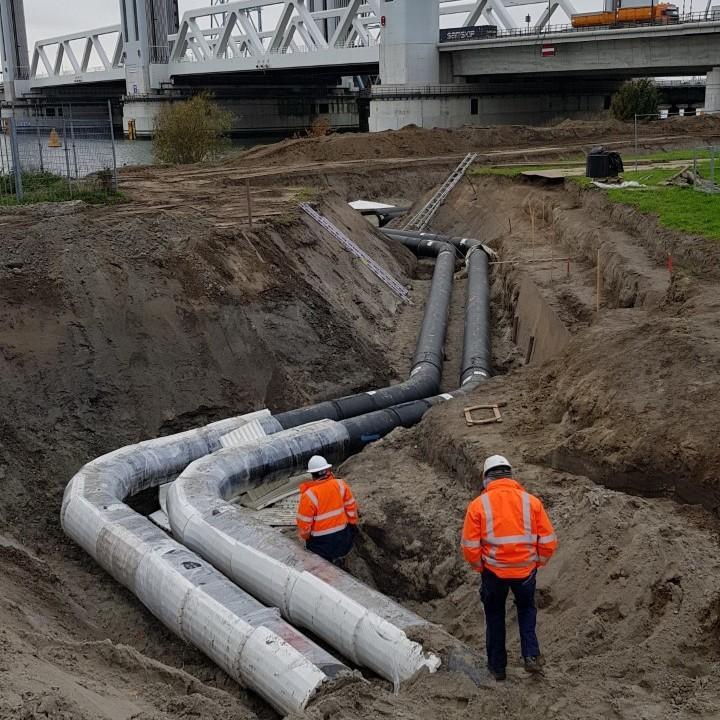
Considering an expansion of your industrial site? Urban planning with district energy simulation? A hydrogen distribution network perhaps? Then it’s time to call in the drawers and calculators at Rotterdam Engineering for your district energy network optimization. If you operate in the Netherlands, that is.
Dutch engineering consultancy Rotterdam Engineering B.V. helps cities, municipalities, utilities, industrial enterprises and building contractors with any challenges around moving matter through pipes, particularly through underground infrastructure. The company has been a happy customer of Fluidit Heat, our simulation software for district energy systems. We figured that was as good a reason as any to have a chat.
One of the pipeline engineers at Rotterdam Engineering is Mark Supper, a graduate from Delft University of Technology. Mark has been using Fluidit Heat for a year now.
“You could say that our team at Rotterdam Engineering consists of draftsmen, constructors, engineers and specialists. As an engineer, one of my main tasks next to hydraulic calculations is to carry out stress analyses to ensure that pipes can handle temperature expansion and pressure,” Mark explains. “It’s all about exchanging knowledge and expertise within our team as well as with our customers. In that context, Fluidit Heat helps us to design and simulate heating infrastructure.”
There’s plenty of underground infra in the Netherlands. Mark: “It’s fascinating how crowded it is down there. Some 80 percent of our projects involve underground city heating systems, water and sewer pipes, and the like. Natural gas pipes are steadily going out of fashion, but we do have projects involving hydrogen, nitrogen, and CO2 – anything that can contribute to the clean energy transition.”
Proud of that personal touch
The Rotterdam Harbour area is, of course, crowded with pipes, both visible and invisible. Above ground, the consultancy company has projects in the harbour with steam infrastructure, among others.
The engineering consultancy is altogether some 100 people strong as part of the UPA Group. Their ambition is to service the largest part of the country with various engineering challenges.
“Some of our competitors have more scale,” says Mark, “but we pride ourselves on our more personal relationships we build with our customers to provide specialty engineering solutions. They tend to come to us – and come back to us – with enthusiasm for what we deliver and our social engagement.”
“Cities and municipalities need to think and act on the energy transition,” he continues. “Sometimes we get involved in a preliminary design for infrastructure surrounding a newly planned residential area or a large building project like a hospital. Or a utility company that wants to build their own heat network. Or a building contractor who has to lay pipes but needs our knowledge and experience to design and engineer them.”
“A municipality says, ‘We want a city heating network for 30 semi-detached houses. How much capacity do we need? Where should the pipes go? How much will it all cost?’”
Value for money
According to Fluidit’s Head of Sales, Ville Ylänne, Rotterdam Engineering knew exactly what they wanted and didn’t even need to attend both of the onboarding training sessions that Fluidit provides.
For Mark Supper and his team, the ease of use to work with location data was an important requirement when evaluating Fluidit Heat.
“We were primarily interested in a calculation and simulation tool that works with geographic information systems (GIS), making it easy to import, manipulate, present and export maps,” Mark says. “Fluidit ticked all the boxes. For example, we really liked the colour coding for temperature, pressure, speed and direction of matter within the network.”
“One project where we used Fluidit was in greenhouse horticulture. With the software we are able to run a scenario that assumes a certain consumption of energy five years from now, showing us how the network – or rather different variations of a future network – will manage. Or we can play out a present-day scenario in which some of the heating sources would fail: how fast and how well can the network compensate for those sources?”
When it comes to value for money, in Mark’s view, Fluidit’s pricing has been very reasonable.
“We have used subscription software that is much less affordable, which means that we only tend to activate those packages for use within specific, paid projects,” he says. “The advantage of Fluidit’s pricing is that we can afford to keep the license active and experiment with it even outside of concrete customer projects. I’d say that’s a great plus.”
Not every user is a programmer
Sounds like it’s all “ruusut” so far. Any “risut?”(translation see: https://bit.ly/3mRsdKQ)
Mark: “Come again? Oh, I see. Well, one thing is the extensibility of the software. It is very open. A user can add functionality with Python scripts, for example, tailoring the tool to their heart’s content. I wonder if Fluidit could make certain extensions available off-the-shelf, though. Like a library of plugins or even pieces of code that one could copy.”
“In short, the freedom to tweak the software is killer, but not every user is a programmer. It might lower the threshold if the developers at Fluidit offered some examples.”
Most of all, he says that the Rotterdammers are particularly happy with Fluidit’s support.
“The team in Finland has been so helpful and open. When we have a question, we always receive a comprehensive response within days. And I love it that they routinely follow up to check if we “got it”. That customer centricity appears to be ingrained in the company’s culture. You can recognise the same vibe all the way through the software’s user interface and even on the wiki help page.”
Fluidit Heat is a perfect fit for utilities from small to large. It caters all your thermo-hydraulic modeling needs. Whether you want to build new pipelines, plan optimal locations for power sources, design heat storages, you name it – Fluidit Heat is the number one tool for you.